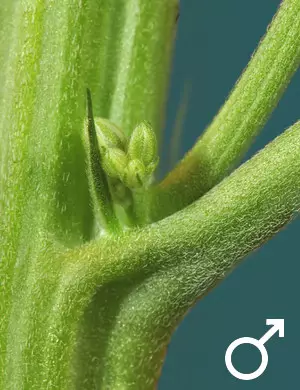
How To Breed Cannabis 101: Make Your Own Strain Of Weed
Last updated: 13 May 2021
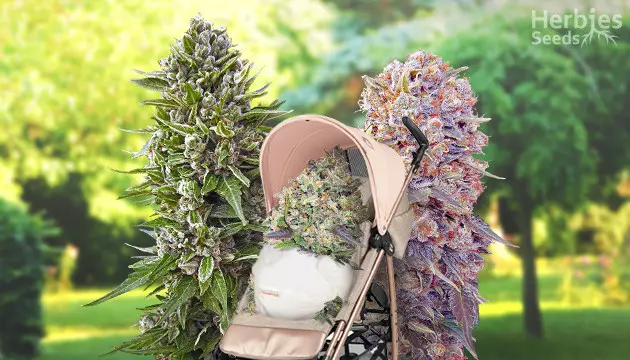
How can you make your own strain of weed? It’s a question that crosses every grower’s mind at some point. After countless hours growing strains bred by someone else, you eventually wonder how to make different strains of weed yourself. Breeding marijuana can definitely be a rewarding experience, although it takes time and dedication. Below, we break down the basics in this intro to Cannabis Breeding 101.
Why Breed Cannabis Strains?

Learning how to make your own strain of weed is one thing. But before we touch on that, why would you want to play god with ganja in the first place?
Breeding cannabis can be both useful and rewarding. If you’re a grower, chances are you’ve wanted to change something about a strain you picked up from someone else. Maybe you wish it was bushier or had a higher yield. Conversely, perhaps you loved how it made you feel or what an incredible aroma it had, and now you want to bring that trait to another favorite strain.
Regardless of why you want to breed your own strain, there’s a process you’ll need to follow.
How To Breed Marijuana
Marijuana breeding isn’t that difficult in theory. While it can easily become a rabbit hole, you’re essentially just combining the genetic traits of two plants. You can use any two strains you want as parents. However, they’ll each need their own room or tent to prevent unwanted cross-pollination.
When breeding cannabis, things can get confusing. That’s why it’s so important to take diligent notes throughout the breeding process – otherwise, you’ll have no idea what’s going on. Make sure you label both strains!
Step 1: Find Males

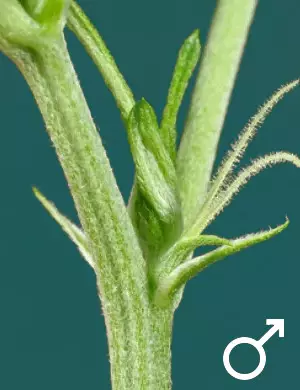
While using feminized seeds usually makes sense for home growers, breeding is the one time you want male plants. Breeding with feminized seeds is possible, although you’ll have a little bit of extra work on your hands. Learn more in our guide to breeding with feminized seeds.
Step 2: Gather Pollen
To get started breeding cannabis, you’ll need some pollen. Pollen, aside from being a trigger for seasonal allergies, is essentially plant sperm. It delivers a male’s genetic material to a female via her pistils. The female then begins to develop seeds instead of flowers. After it matures, these seeds will fall out, leaving you with a handful of new seeds.
To gather pollen, wait until the male plant is in the early flowering phase. It should actually open its pollen sacs on its own. When that happens, cover the plant with a plastic bag and shake it to collect the pollen inside.
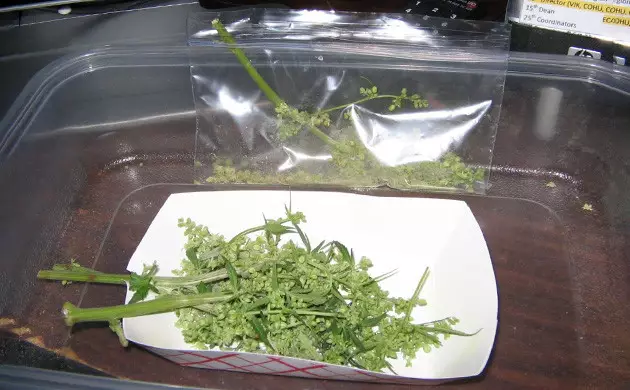
Step 3: Spread Pollen
Next up in our lesson on how to breed weed is spreading pollen. Take the plastic bag of pollen and insert it over a flowering branch of the female plant. This female plant should be around the same age as the male plant – in the early flowering cycle. Seal the bag and shake it. Let it sit for about an hour before repeating this process with the rest of the plant.
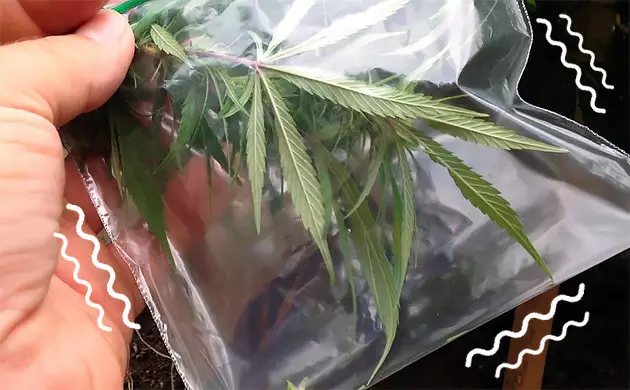
Step 4: Gather Seeds
Now it’s time to play the waiting game. Wait until the late flowering cycle for your seeds to develop. You’ll be able to keep track of this visually. Once your plant is mature, you can gather the seeds and germinate them.
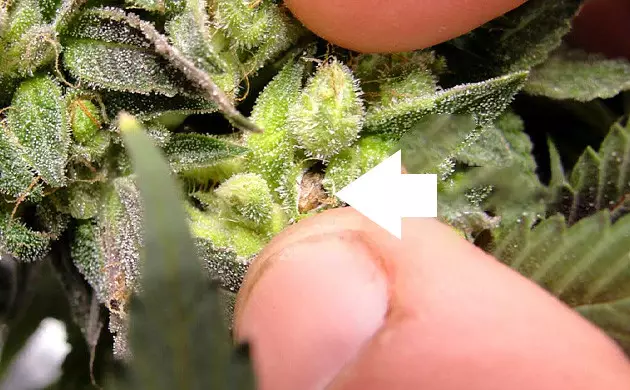
Step 5: Stabilize Genes
The last step of cannabis breeding is stabilizing your genetics. Even though multiple seeds share the same parents, that doesn’t mean they’ll grow up to be identical. In fact, seeds that were “born” in the same batch can even exhibit different physical traits like height, yield, THC or CBD content, terpene profile, and more. That’s why it’s important to learn how to stabilize a strain.
Using a technique called “backcrossing,” you can ensure greater uniformity across seeds once they mature. Backcrossing is essentially breeding a strain with its mother to hammer out any genetic irregularities.
Let’s use an example to understand how to stabilize a strain. Say you breed Strain A x Strain B. To stabilize your seeds’ physical traits, you’ll need to find a male Strain A x Strain B cross. We’ll call this male Strain C. To backcross, you’ll breed Strain A x Strain C. Then, you’ll take the offspring from that pairing and breed it once again with Strain A. Using this technique, you can instill uniformity in your plant’s genetics, ensuring every seed is the same.
After Breeding: Cloning
Cloning is a great way to preserve your genetics after successfully breeding cannabis. This has several advantages for breeders who successfully stabilize their strains’ genetics.
Cloning creates a plant that’s an exact genetic match to the plant it was clipped from. As a result, you can both flower out your new strain while nurturing the clone into a full, healthy plant. Then, repeat the process. Using this technique, you can flower plants indefinitely while keeping your new strain’s genetics safe in the veg phase.
For more info on cloning, check out our complete guide.
Recommended Breeding Pairs
Below, we’ll cover some potential breeding pairs. We chose these regular strains for a variety of reasons, and we’ll use them as examples of traits to look for in this cannabis breeding guide.
Blueberry x Papaya
First up on our list of best strains to crossbreed are Blueberry and Papaya. Why breed these two strains? Their incredible flavor, of course! Blueberry is famous for its fruity taste, while Papaya is lesser-known but still delivers in the flavor department. Additionally, both have respectable THC concentrations.

Finally, they both boast similar genetic profiles. They’re both Indica-dominant while maintaining enough Sativa genes to offer a cranial and uplifting high. That genetic blend also makes both strains well-suited for outdoor gardens.
G13 Haze x Hindu Kush
Sometimes, crossing strains arises from a desire for great taste, like the Blueberry x Papaya example above. But at other times, you’re not trying to manifest any specific flavor, aroma, or even type of high. Instead, it’s all about utility.

That’s why we think G13 Haze and Hindu Kush are good cannabis strains to cross. As a Sativa-dominant hybrid, G13 Haze has a long flowering time ranging from 65 to 75 days. In contrast, Hindu Kush is relatively quick to mature at 45 days from the start of flowering.
By crossing these two plants, you can breed a new strain with many of the same traits as G13 Haze, but with a shorter flowering time. What’s more, the resulting crossbreed should grow shorter and bushier, making the plant easier to grow indoors.
Northern Lights x Delicious Candy
Finally, there are situations where you’re not looking for specific traits to breed into your plants. Instead, you’re trying to discover how to make different strains of weed with genetics that are already legendary.

That’s the idea behind this Northern Lights x Delicious Candy cross. Northern Lights has been a staple strain for countless breeders over the decades. On the other hand, Delicious Candy is a newer strain, but has won its fair share of awards in a short time. Combining these two potent genetics is sure to create a powerhouse strain.
Breeding Marijuana Is For Everyone
Remember: anyone can learn how to breed cannabis! With just a little research and practice, you’ll be able to churn out your own custom strains in no time. Learning how to crossbreed weed can be tricky at first, but it’s ultimately a deeply rewarding experience. Good luck!
Herbies Head Shop expressly refuses to support the use, production, or supply of illegal substances. For more details read our Legal Disclaimer.












Thank you for leaving a comment for us!
Your feedback will be posted shortly after our moderator checks it.
Please note that we don’t publish reviews that: